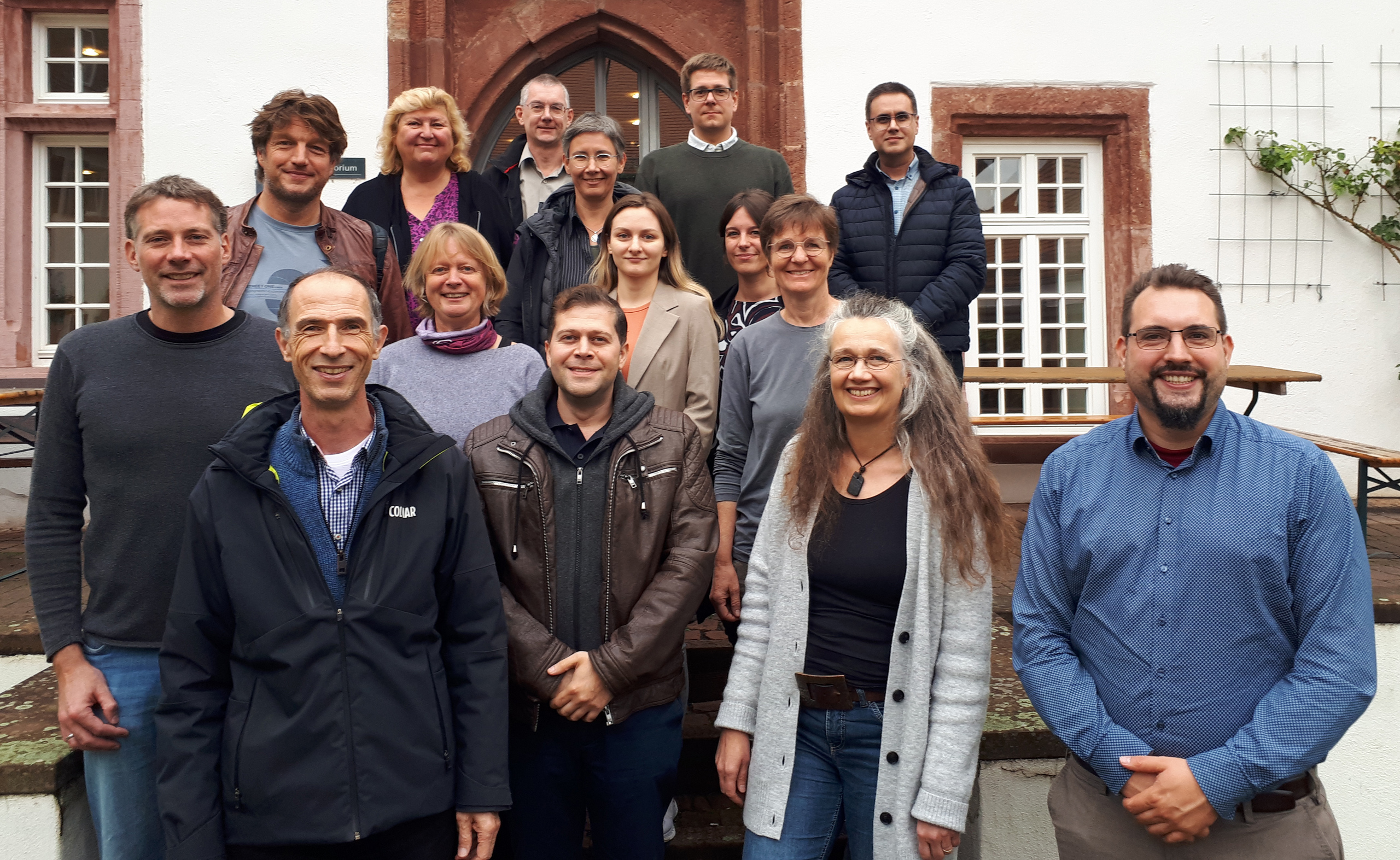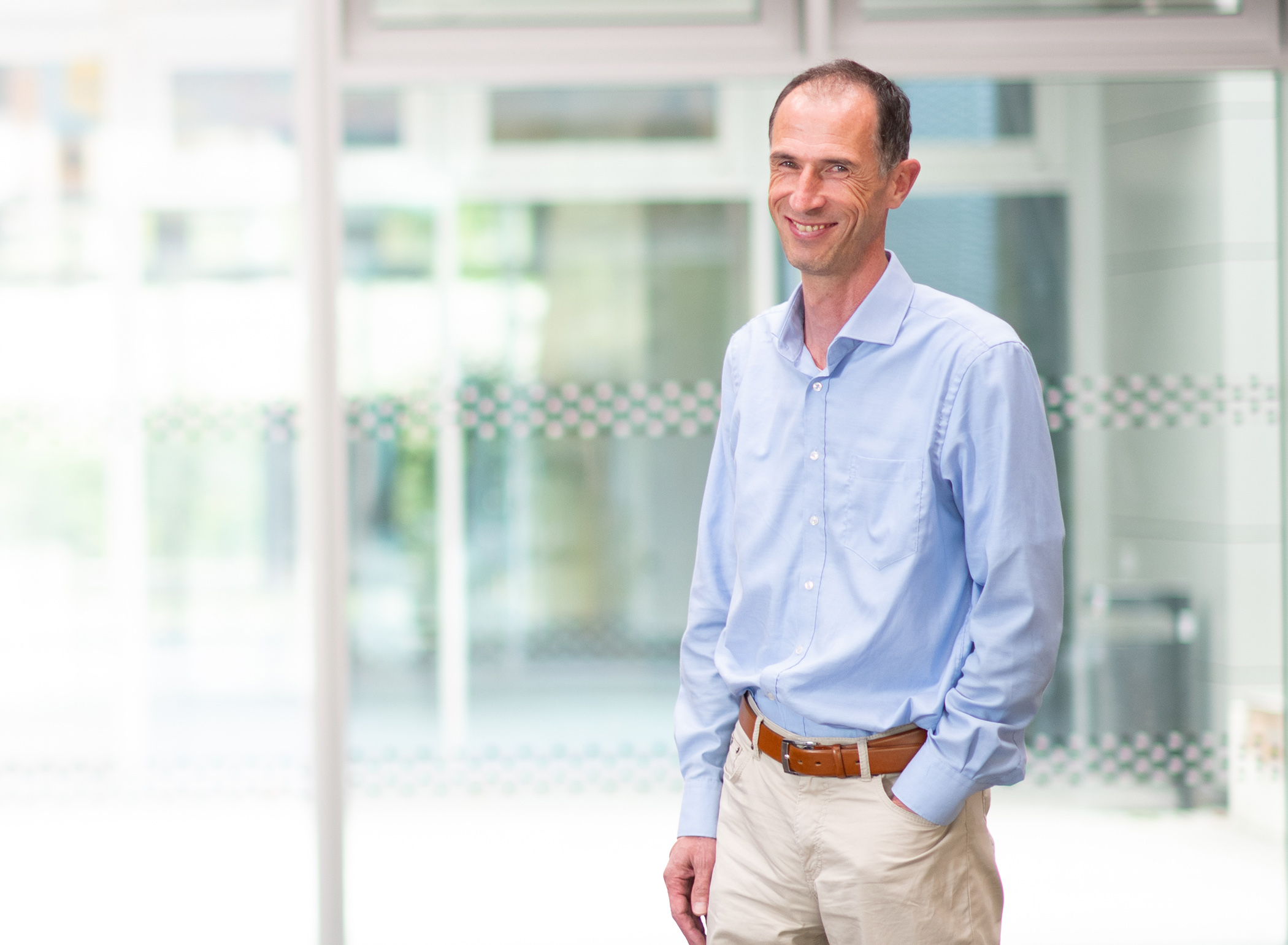Research Centre for Applied Computer Science

In the search for research funding, finding the right call for proposals or funding line is not always easy. How can scientists navigate better through the funding jungle? Where can they find advice, suitable partners or technical support? Faced with high teaching loads, where can they find the time to start looking for funds in the first place? These are some of the obstacles that can stand in the way of a research project and that the “Research Centre for Applied Computer Science” (fz ai) would like to remove for h_da members.
Interview: Astrid Ludwig, 12 December 2024
impact: What idea or goal is h_da pursuing with its Research Centre for Applied Computer Science?
Professor Bernhard Humm: In 2016, the State of Hesse granted its universities of applied sciences the independent right to award doctoral degrees. In this context, and among other things, the cross-university Doctoral Centre Applied Computer Science was approved in 2017, in which h_da is involved alongside Frankfurt University of Applied Sciences, Fulda University of Applied Sciences and Hochschule RheinMain. However, the bar is set high for scientists and professors wanting to be admitted to this doctoral centre. They are obliged to raise around €300,000 in external funds over three years. That is why the Research Centre for Applied Computer Science (fz ai) was established at h_da in 2017 with the aim of boosting research and providing targeted support for researchers so that they are in a position to be accepted into the doctoral centre, too.
impact: So the primary goal is not just to motivate scientists to undertake a doctoral degree?
Humm: It is one of the centre’s goals, but not the only one. The overall aim is to network and support active researchers at h_da, whether they are prospective doctoral students, doctoral candidates or professors. Boosting research is among h_da’s strategic objectives – our centre is a means of achieving this objective. Quite simply, you can achieve more together than you can alone. For example, the fz ai brings researchers together with colleagues who they perhaps did not know before. This sometimes leads to new points of reference or even joint research proposals. We offer our researchers advice, establish contacts to potential internal or external partners and help them with IT infrastructure.
impact: How successful have you been so far?
Humm: At the present time, over 30 professors are members of the research centre, half of whom also meet the criteria for membership of the doctoral centre. In addition, there are affiliates from six of the university’s faculties, including Mathematics and Natural Sciences, Electrical Engineering and Information Technology, Media, Mechanical and Plastics Engineering, and Darmstadt Business School, which all have something to do with IT. We are currently supporting and networking over 80 researchers in applied computer science.
impact: Can you please describe such networking and give us an example?
Humm: Yes, of course. One example is Dr Lukas Kaupp, a computer scientist and our managing director, who wrote his dissertation at the Doctoral Centre Applied Computer Science. He has developed software that is designed to prevent expensive and protracted system failures in digitalised production lines. In a nutshell, it contributes to rapid fault diagnosis in smart manufacturing. Via the fz ai, he came into contact with Professor Stephan Simons, who is working on Industry 4.0 at the Faculty of Electrical Engineering and Information Technology. Professor Simons has set up an intelligent learning factory, the Smart Factory, at h_da. The large volume of data that can be collected in the Smart Factory was crucial for Lukas Kaupp’s doctoral dissertation. This is a good example from practice of networking between institutions and colleagues who did not know each other at all before the fz ai was established.
impact: Do you have any other examples?
Humm: Countless. For example, a biodiversity research project funded by the Federal Ministry of Education and Research (BMBF) that uses artificial intelligence to help analyse image, video and audio data. h_da’s Faculty of Computer Science is participating in the project, and its partners include the Senckenberg – Leibniz Institution for Biodiversity and Earth System Research (SGN), the University of KwaZulu-Natal in South Africa and the Bavarian Forest National Park. Another project is the Competence Centre for Work and AI, for which the Federal Ministry of Education and Research has granted funding of €10m. The centre is looking at how technical developments affect the world of work and conducting research into new applications for AI-based systems. The main applicant in this case is TU Darmstadt, but four professors from three of h_da’s faculties are also involved. These, too, are examples of our research centre’s networking activities and how it establishes personal contacts between scientists.

impact: Can you describe the centre’s work in detail? What resources do you have at your disposal?
Humm: Since the fz ai was established, we have invested around €250,000 in hardware – for example project servers so that our scientists have sufficient computing power for their research, can calculate AI models or create project websites. We also have an annual budget of around €20,000 to cover travel expenses or funds for participating in conferences and annual meetings. Our managing director, who organises technical services, keeps everyone informed about calls for project proposals, helps with applications, establishes and coordinates contacts with partners and companies, is also financed from this budget. He is a tremendous help and source of support for our researchers.
impact: You also organise workshops?
Humm: Yes. In 2024 there was a two-day workshop, which was very much in demand and a great success. We worked closely together in small groups. The participants were able to suggest their own topics and decide which ones were chosen. Together we discussed AI in IT security, urban resilient infrastructure, digital disinformation and predicting termination in psychotherapy, among other things. We were able to give each other advice or recommend solutions. This is exactly how interdisciplinary research should be. Nobody withholds their knowledge but instead shares it. This led to concrete results that were applicable in practice. The workshop was a highlight because it was precisely the wide range of topics that made all the difference.
impact: How has the fz ai developed since it was first established?
Humm: We have grown continuously. We initially had about 20 members, today we are supervising more than 80 researchers and supporting 36 ongoing research projects. We document our work and development in an annual report. We started as a project at h_da in 2017, and in 2023 we were made one of its central organisational units – complete with statutes and spokesperson. This was a big step as well as confirmation of our successful work. We are now more visible in the university landscape, which is very pleasing and helps us to continue our work.
impact: What objectives or issues will the fz ai pursue in the future?
Humm: A lot has happened at h_da in recent years as far as research is concerned. In this context, it is important to remember that the goal is not just to acquire knowledge but also to benefit society. Application-oriented research at h_da is always related to important social issues or linked to the UN’s Sustainable Development Goals such as climate action or affordable and clean energy. The fz ai wants to underpin the way that research is conducted at our university. This includes strengthening its interdisciplinary formats and further developing the research structure as a whole. We want to establish an individual research culture and a culture of collaboration.
Contact the h_da scientific editorial team
Christina Janssen
Science Editor
University Communication
Tel.: +49.6151.533-60112
Email: christina.janssen@h-da.de
Translation: Sharon Oranski
fz ai management and contact
The Research Centre for Applied Computer Science (fz ai) was established in 2017. It is headed by Professor Bernhard Humm, who is also its spokesperson, together with Professor Kawa Nazemi and Professor Christoph Krauß. Dr Lukas Kaupp is the centre’s managing director.
Website: fzai.h-da.de/
